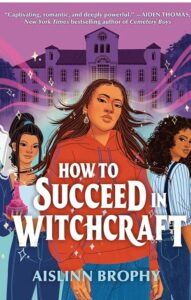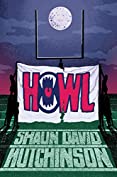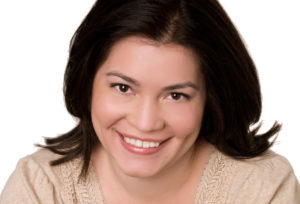How to Succeed in Witchcraft by Aislinn Brophy
G.P. Putnam’s Sons Books for Young Readees, 2022
ISBN-13: 978-0593354520
Available: Hadcover, paperback, Kindle edition, audiobook
Buy: Bookshop.org | Amazon.com
Shay is one of the few students of color at T.K. Anderson Prep. In a world where only licensed magic users can get top jobs, she is a striver. She has a higher level of magical strength than anyone else in her class, and the second highest GPA. Her rival, with a slightly higher GPA and slightly lower magic level, is Ana.
At a meeting about the application process for a scholarship the school offers for a student to attend the University of Wilmington, which offers magic licensing, theater teacher Mr. B, who heads the scholarship committee, suggests to Shay that if she wants the scholarship she should participate in the school play, which is intentionally “diverse”. Shay is a terrible actor, but discovers she has been assigned the lead role of Valeria. Ana, also a student of color, is cast as her sister, Gabriela.
As the year goes by, Shay stumbles into friendship with Ana, and then into a (closeted) romance. Mr. B. continues to single Shay out for special attention and private rehearsals, violating her physical space (she does not like to be touched: based on this and other behaviors I think she is coded as autistic). She is uncomfortable, but none of the other kids seem to be bothered by Mr. B. When Shay is accidentally outed, he is cold to her, turning his attention to Ana, until Shay convinces him she isn’t a lesbian, so she can keep his attention and win the scholarship.
One night Shay’s dad’s car dies while he is on his way to pick her up from school, leaving her on campus alone. While she is walking the school grounds, she sees Mr. B. and student choreographer Brittany kissing. Brittany is sharing her magic with him, which makes him stronger, but leaves her open to manipulation. Shay decides she has to tell, even if it means losing the scholarship, and does so in such a public way that the administration is forced to act.
There’s a lot of subtext on privilege, systemic racism and classism, college admissions, the impossibility of the American dream, and the way sexual and emotional abusers take advantage and get away with it. Mr. B is a truly predatory character and Shay’s eventual confrontation with him is terrifying, At the same time, this is a really sweet rivals to lovers sapphic romance with some great world-building. It’s not truly horror, but it is a wonderful, witchy read that should be relatable to teens.







Follow Us!